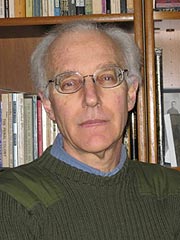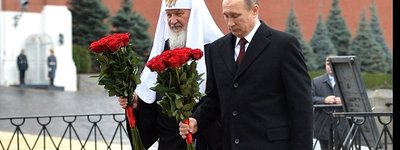Moral Relativism In Moscow

 Recently American philosopher George Weigel reported that in an interview with Russian Orthodox Metropolitan Hilarion of Volokolamsk, he had asked whether the March 1946 "Council" of Lviv, which purported to liquidate the Ukrainian Greek-Catholic Church, was a "theologically legitimate ecclesial act." Hilarion had unhesitatingly replied in the affirmative. When Dr. Weigel pointed out that historians consider the event as having been organized by the Soviet security police, the Metropolitan reflected that the "modalities" of history are always complicated and that in any case, it was always legitimate for straying members of the Russian Orthodox Church to return to their ecclesial home. http://www.firstthings.com/onthesquare/2011/03/rome-and-moscow)
Recently American philosopher George Weigel reported that in an interview with Russian Orthodox Metropolitan Hilarion of Volokolamsk, he had asked whether the March 1946 "Council" of Lviv, which purported to liquidate the Ukrainian Greek-Catholic Church, was a "theologically legitimate ecclesial act." Hilarion had unhesitatingly replied in the affirmative. When Dr. Weigel pointed out that historians consider the event as having been organized by the Soviet security police, the Metropolitan reflected that the "modalities" of history are always complicated and that in any case, it was always legitimate for straying members of the Russian Orthodox Church to return to their ecclesial home. http://www.firstthings.com/onthesquare/2011/03/rome-and-moscow)
This statement is extraordinary first of all because it openly condones a gross violation of freedom of conscience and religion. Perhaps the Metropolitan thinks that the political context of any church event can be ignored, as if spiritual and ecclesiastical phenomena could be kept strictly isolated from their circumstances. That would be taking the "separation" of church and state very far indeed. For what happened in Lviv in March 1946 was precisely the opposite. Simply put, the state used one church to destroy another. For the Moscow Patriarchate to deny its collaboration with the state and the security apparatus is mendacious; to pretend that this doesn't affect the canonicity of the "council" is willfully blind.
Or perhaps Metropolitan Hilarion was appealing to the principle that evil actors can sometimes do God's will. Thus, by bringing the Uniates into the Orthodox Church, Stalin's NKVD did a good deed despite its evil intent. But if he considers forcible conversion a good, he has a curious understanding of religious conscience and belief.
Hilarion's comment that it is always legitimate for wayward Russian Orthodox to return to "their" Church betrays a willful ignorance of history. The Lviv pseudo-council was not a "return." Neither the Ukrainian Greek-Catholics nor their ancestors had ever been part of the Russian Orthodox Church. Indeed, reluctance to come under the newly (1589) created Moscow Patriarchate – itself the product of an ecclesial act of dubious legitimacy -- may have been a motive for the Orthodox of the Kyivan Metropolitanate, then under Constantinople, to join with Rome seven years later.
The metropolitan's words also suggest a remarkable misunderstanding of elementary canonical principles. The Moscow Patriarchate may consider the events of March 1946 to have been a council of the Russian Orthodox Church – after all, Russian Orthodox hierarchs (some of them former Catholics) helped organize it and participated in the proceedings. But a Russian Orthodox council cannot make decisions on behalf of another Church. And this certainly was no council of the Greek-Catholic Church, as its metropolitan and all its local bishops were under arrest.
Quite possibly, the metropolitan thinks that even if the Lviv gathering was in reality a political act, it was no more political than the Council of Brest of October 1596, which laid the groundwork for the Greek-Catholic Church in the first place. According to this line of reasoning, two wrongs make a right. But such a view of the Union of Brest is based on a long-standing misconception – unfortunately, one shared by some Ukrainian historians and churchmen. This is the notion that the Polish crown "forced" the Orthodox Metropolitanate of Kyiv to join with the Roman Church. Recent historical studies, particularly Borys Gudziak's "Crisis and Reform" (1998, Ukrainian translation 2000), have dispelled this myth. And while historical comparisons are difficult and require considerable research, it seems indisputable that the kind of coercion exercised towards Orthodox believers in the sixteenth and seventeenth centuries can hardly be compared to the machinery of repression perfected by the Stalin regime. A reading of Bohdan Bociurkiw's "The Ukrainian Greek Catholic Church and the Soviet State, 1939-1950" (1996) should put that notion to rest.
The misconception about the coerced nature of the Union of Brest may stem from the view that Ukrainians (and Belarusians) are inferior, "ahistorical" peoples, incapable of making any independent decisions and fit only to be manipulated. Political commentator Mykola Riabchuk has characterized this as a typically colonial attitude. In his view, colonizing powers characteristically instill in the colonized population a demeaning stereotype, according to which it could never, for example, seek independence, except as the puppet of a rival colonial power. Thus, the Ukrainian declaration of independence and subsequent war of liberation in 1918-1921 could only have been an Austrian plot, while the "Orange Revolution" of 2004 must have been organized by the CIA (Mykola Riabchuk, "U lizhku zi slonom," in Postkolonial'nyi syndrom: sposterezhennia, Kyiv, 2011). Applying this analysis to the Union of Brest explains why the Russian Orthodox Church can only see this act as the work of the Polish crown, manipulating the weak and ignorant Kyivan Metropolitanate. The notion that the Ruthenian Orthodox bishops of Ukraine and Belarus were independent actors who consciously and deliberately chose to unite with Rome is simply unthinkable. For this reason, the Moscow Patriarchate persists in calling on these confused, misguided Uniates to "return" to Russian Orthodoxy. And if they insist on being Catholic, they should join the Latin-rite Church of the Poles, the Russians' equals as a historic, colonizing nation.
But the most disturbing feature of Metropolitan Hilarion's remarks is the slippery reference to history's "complicated modalities." He seems to be implying that there are no clear, objective standards by which to determine whether an ecclesial act was free or forced. It follows that the legitimacy of church councils is a matter of subjective opinion. This, of course, smacks of relativism. For a prelate who has denounced the moral relativism of the West, this seems a particularly cynical position.










